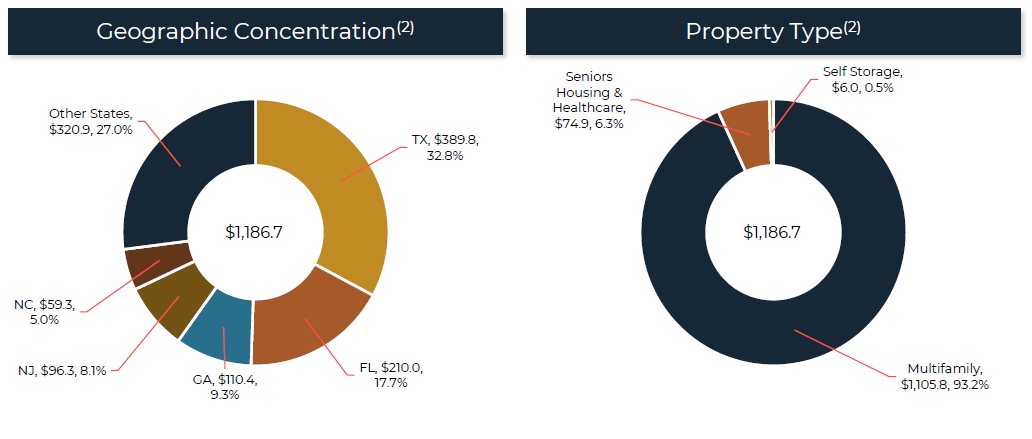Welcome back to the “Probably Not a Value Trap” series where I discuss businesses with a 10%+ dividend yield which I believe probably won’t get cut and why, but don’t come after me on Twitter if they do.
One of my former students recently had the misfortune of having his investment bank require him to delve deep into the sad sad world of mortgage REITs. Mortgage REITs are a depressing space, filled with value traps that fool investors by paying them back their principal as a dividend and stick them with a tax bill while tricking them into eating their seed corn. ARMOUR Residential REIT (ARR) is the classic example, and if you spent any time chasing dividends, you were probably burned by them as well.
But even the worst sectors can have their standout opportunities, and this was his pick as the best of the batch, Lument Financial (LFT). There is so much negative sentiment surrounding commercial real estate, but this negative sentiment is misleading, because primarily there is a problem with office towers, and not much else. Sectors like multifamily housing are expected to deliver solid rents for many years as newbuild costs aren’t justified at higher interest rates, and ten million illegal immigrants are supporting demand. Given the large barrier to home ownership at current interest rates, middle-market multifamily might just be the best slice of the commercial real estate market at the moment.
Lument Financial is the amalgamation of three legacy assets of ORIX (IX), the Tokyo based financial services company with over $400 billion of assets under management. ORIX smashed together three legacy businesses from various acquisitions over time, Hunt Real Estate Capital, Lancaster Pollard, and RED Capital Group to create Lument Financial, a company that focuses on making bridge loans to middle-market multifamily operators. The relationship as a partial subsidiary of ORIX gives Lument access to expertise, resources, and lending from their parent company. This allows LFT to have the mispricing of a small cap, but access to the resources of a large cap.
One of the main risks in commercial real estate is the leverage on leverage. For LFT, they borrow long at low rates, SOFR +1.61%, and lend short at higher rates, SOFR +3.59%. This protects them from changes in Jerome Powell’s short term interest rates, at least until the loans mature and the capital needs to be redeployed. For now, the loans deployed are on a 3 year plus 1 year plus 1 year basis, with the borrower having the options to extend. For the portfolio, 93% of the loans are collateralized by multifamily properties which when underwritten were below 80% loan to value ratios. With rising interest rates, property values fell, but LFT makes bridge loans for value-added redevelopment opportunities, and as the business plans unfold, the properties typically become more valuable through renovation. Weighted average remaining term on the portfolio is 30 months, if all extensions are triggered by borrowers. There is also a strong sunbelt focus on Lument’s multifamily borrowers.
One potential problem is that the pipeline of new bridge loans for multifamily developments and renovations has mostly dried up. This could cause funds to be returned to shareholders when the loans mature and are repaid but cannot be redeployed. This would normally be unfortunate, however, when you can buy the REIT at $0.70 to the tangible book value, if all the maturing loans and the corresponding income were just returned to shareholders over the next 30 months, it would be an amazing return, a 12% annual income stream and a 30% return to par.
Management believes the deal pipeline will start to flow again, due to the falling interest rate environment. While new multifamily construction might be in the doldrums for a while longer, Lument is a potential lender for bridge loans when multifamily assets are sold, and the new owner has a major renovation plan. This volume could easily pick up with falling interest rates as formerly trapped owners will take the opportunity to sell.
The primary risk on this leveraged business model is defaulted loans for which the collateral has fallen in value. Investors in this space are relying on management to do their jobs well, execute at a high level, and prevent this worst case outcome. Unusual for mortgage REITs, LFT has regular insider buying by four directors, the CEO, and the CFO, with no selling, and purchases above the current share price. The management team believes in the business, and is signaling that the current price is cheap enough.
With the volatility of the market going toward the election, interest rate cuts, and the dreaded September October season for the stock market, it is entirely possible that there will be an opportunity to buy LFT at a price below the current $0.70 to tangible book. But for an income portfolio, I would be happy buying some here. It’s good to have an unrelated income stream to diversify risk from the other “Probably Not a Value Trap” companies which are currently dominated by shipping and energy.
Mortgage REITs are a terrible space, but sometimes even in a terrible space, there are amazing opportunities.







you are really good at prompting ai generated images.